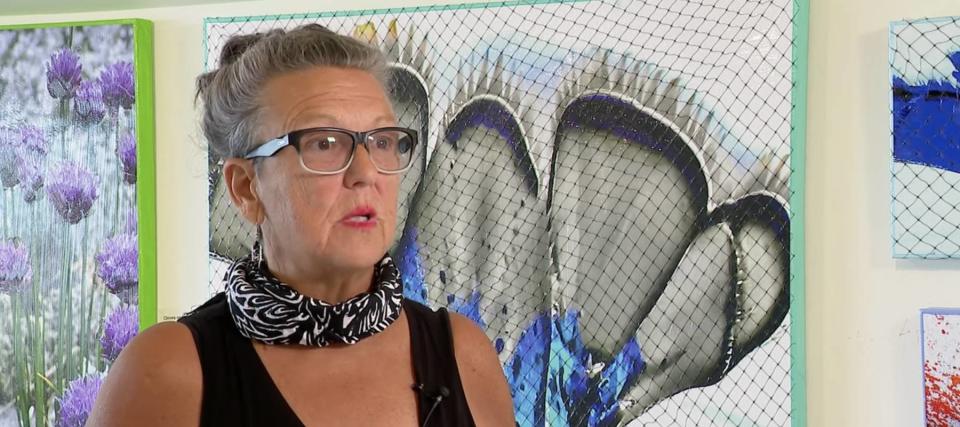
After a long day helping customers at her art studio, small business owner Amy Kelly, 65, got a phone call that changed her life.
It was 4:30 p.m. on Sept. 5 when the Maine resident received a call from a person claiming to be a customer service representative from the Bank of America’s fraud department. The man said his name was Justin Turner.
Don’t miss
-
Car insurance premiums in America are through the roof — and only getting worse. But 5 minutes could have you paying as little as $29/month
-
Commercial real estate has beaten the stock market for 25 years — but only the super rich could buy in. Here’s how even ordinary investors can become the landlord of Walmart, Whole Foods or Kroger
-
These 5 magic money moves will boost you up America’s net worth ladder in 2024 — and you can complete each step within minutes. Here’s how
He told Kelly that the bank was getting in touch with her to prevent an unauthorized transaction on her account. The man said she was going to lose $23,000 by the next day.
In order to stop this transaction, he said, Kelly needed to share her screen with him in order to complete a wire transfer to “protect” her money.
“I was starting to panic and all my logic just went out the window,” she told CBS 13 News.
After sending the money, Kelly asked “Justin Turner” if she should go to her Bank of America branch to ensure the process was completed properly. He said no — it was “all taken care of.”
“That’s when I knew I had been scammed,” she said.
When she immediately went to her Bank of America branch, Kelly alleges she was kept waiting to be put in touch with the manager for six hours. Now, weeks later, the issue is still unresolved.
Signs that you may be dealing with a scammer
According to the latest data from the Federal Trade Commission (FTC), American consumers reported a loss of more than $10 billion to fraud in 2023 alone.
In particular, imposter scams — which includes bank transfers similar to what Kelly experienced — saw a loss of $2.7 billion.
In addition, a 2023 Gallup poll found that 15% of U.S. adults revealed at least one member of their household had fallen victim to a scam in the last year.
In Kelly’s situation, “Justin Turner” created a sense of urgency in order to manipulate her into sending $23,000. According to the Consumer Financial Protection Bureau (CFPB), this is one of the many tactics used by fraudsters.
There are several red flags that may indicate you’re dealing with a scammer. The CFPB suggests Americans be on high alert for anyone claiming to be from the government, a bank, a business, or a relative, asking you to pay money or taxes upfront — or informing you that you’ve won a prize that requires upfront payment.
Be wary of anyone asking you to wire money, send cryptocurrency, or download a payment app to transfer funds. The pressure to “act now” is a big indicator of a scam.
In Kelly’s case, she was exhausted after a particularly hectic workday which made her more susceptible to being scammed.
Read more: Rich, young Americans are ditching the stormy stock market — here are the alternative assets they’re banking on instead
How to protect yourself from a scam
The easiest way to protect yourself from being scammed: don’t pick up calls that aren’t in your contacts. If the person is legitimate, they’ll leave a voicemail and callback number.
Of course, there are other ways scammers can contact you, such as through email or text. Avoid clicking on any links or scanning QR codes. These actions can result in the scammer overtaking your phone or redirecting you to a malicious website.
According to the CFPB and other online resources, people should avoid sharing PINs, passwords, financial account information, credit card numbers, or Social Security details.
Don’t react too quickly to what you’re being told: scammers will often play into a person’s emotions in order to deceive them into sending money. Although it’s easier said than done, consider documenting the call — especially if it starts out with a sense of urgency.
If you record it or take notes while it’s happening, it may help you spot red flags faster — while also offering you a window of opportunity to slow down and assess the situation before reacting.
If you’re still uncertain as to whether it’s a scam, hang up and call the institution back with a verified number.
For added protection, you can also put yourself on the FTC’s National Do Not Call Registry.
As for Kelly, the small business owner scammed by “Justin Turner,” she alleges the Bank of America branch manager told her to fill out the Scam Victim escalation paperwork and retain a lawyer.
“They haven’t been helpful at all. I just don’t believe they did right by me,” she said. “It was really strange that it [was] not a priority.”
A Bank of America spokesperson told CBS 13 News that it was in the process of recovering Kelly’s funds from the receiving bank, but there’s no guarantee they could retrieve it.
Now, after 23 years as a Bank of America customer, Kelly has transferred all her money over to another financial institution.
What to read next
This article provides information only and should not be construed as advice. It is provided without warranty of any kind.
